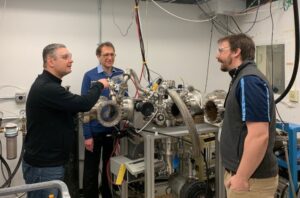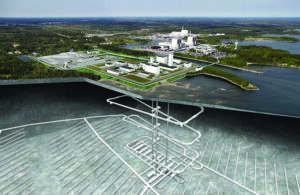Research and Development
-
Gas
Optical Continuous Emissions Monitoring for Combustion Turbine Systems
Natural gas electrical generation has increased significantly in recent years due to its cost advantage and reduced carbon footprint relative to coal. Many utilities are shifting to natural gas as a bridge fuel on their path to the ultimate goal of a net-zero carbon future. With the increase in gas-fired generation, the evaluation and demonstration […]
-
Press Releases
DOE Project Highlights Advantages of Hybrid Energy Storage
ENERGY SECURITY, ECONOMIC SAVINGS, LOWER EMISSIONS (Palo Alto, California—March 28, 2022) Confronted with accelerated timelines to dramatically reduce carbon by 2030 while maintaining reliability during seasonal and extreme weather events, a new study for the U.S. Department of Energy’s National Energy Technology Laboratory (NETL) offers electricity providers a rapid and feasible path: hybridize long-duration thermal […]
Tagged in: -
Hydrogen
Making the Best Decisions on Air, Water, and Energy Products Relative to Hydrogen Combustion
Power plants are planning very large investments in generators fueled by hydrogen, methane, mixtures, or ammonia. While hydrogen has the environmental advantage of zero carbon emissions, it has many disadvantages in terms of physical characteristics and safety. The demand on the valves, compressors, burners, NOx control, and other air, water, energy (AWE) products and services […]
-
Press Releases
Westinghouse eVinci Micro-Reactors Energize Canada’s Carbon-Free Efforts
Company’s micro-reactor receives Government of Canada Funding, supports country’s aggressive climate goals Burlington, Ontario, Canada – March 17, 2022 – Westinghouse Electric Canada announced today, along with the Honourable François-Philippe Champagne, Minister of Innovation, Science and Industry, an investment of C$27.2 million from the Government of Canada’s Strategic Innovation Fund (SIF). This investment will support […]
Tagged in: -
Nuclear
DOE Funds New Program to Recycle Used Nuclear Fuel, GE Conducting Innovative Related Research
The U.S. Department of Energy (DOE) announced this week that it would provide up to $48 million for a new Advanced Research Projects Agency-Energy (ARPA-E) program that could substantially reduce the disposal impact of used nuclear fuel (UNF). The program, dubbed CURIE (Converting UNF Radioisotopes Into Energy), is intended to support “a comprehensive national strategy […]
-
Gas
New Realms for Gas Power Technology
Gas power technology developers are exploring new roles and applications to ensure gas power will remain relevant as power markets embrace decarbonization. At the end of 2020, about 1,600 GW of gas turbines
-
Nuclear
Sweden’s Government Approves Construction of Spent Nuclear Fuel Repository
Sweden’s government in late January gave radioactive waste management company Svensk Kärnbränslehantering AB (SKB) the green light to proceed with a deep geological repository (DGR) for spent nuclear fuel (SNF) at a site near Vattenfall’s 3.2-GW Forsmark nuclear power plant. The milestone, which wraps up a planning process that has taken more than 40 years, makes Sweden only the second country, after Finland, to take active steps on building a permanent SNF repository.
-
Gas
Low-Cost Long-Duration Energy Storage at a Natural Gas Pipeline
An energy storage project based on Compressed Natural Gas Energy Storage (CNGES) technology is being studied at the Abbott Power Plant in Illinois. This article presents an overview of CNGES technology
-
T&D
Composite Insulator Application and Design for a Growing and Evolving Transmission Grid
The need to integrate renewable energy resources, and prepare for increased demand for power as electrification takes hold in transportation and other sectors, creates challenges for an aging grid. Some
Tagged in: -
Hydrogen
Decarbonizing the World: Hydrogen Technology Is the Next Big Thing
Many experts believe hydrogen holds great promise as a clean energy resource that can help nations achieve carbon-free goals. Green hydrogen, which is made from water through electrolysis powered by renewable energy, could be used to decarbonize a wide range of hard-to-abate industries, including petrochemical, cement, and steel, which often require high temperatures and combustion […]








